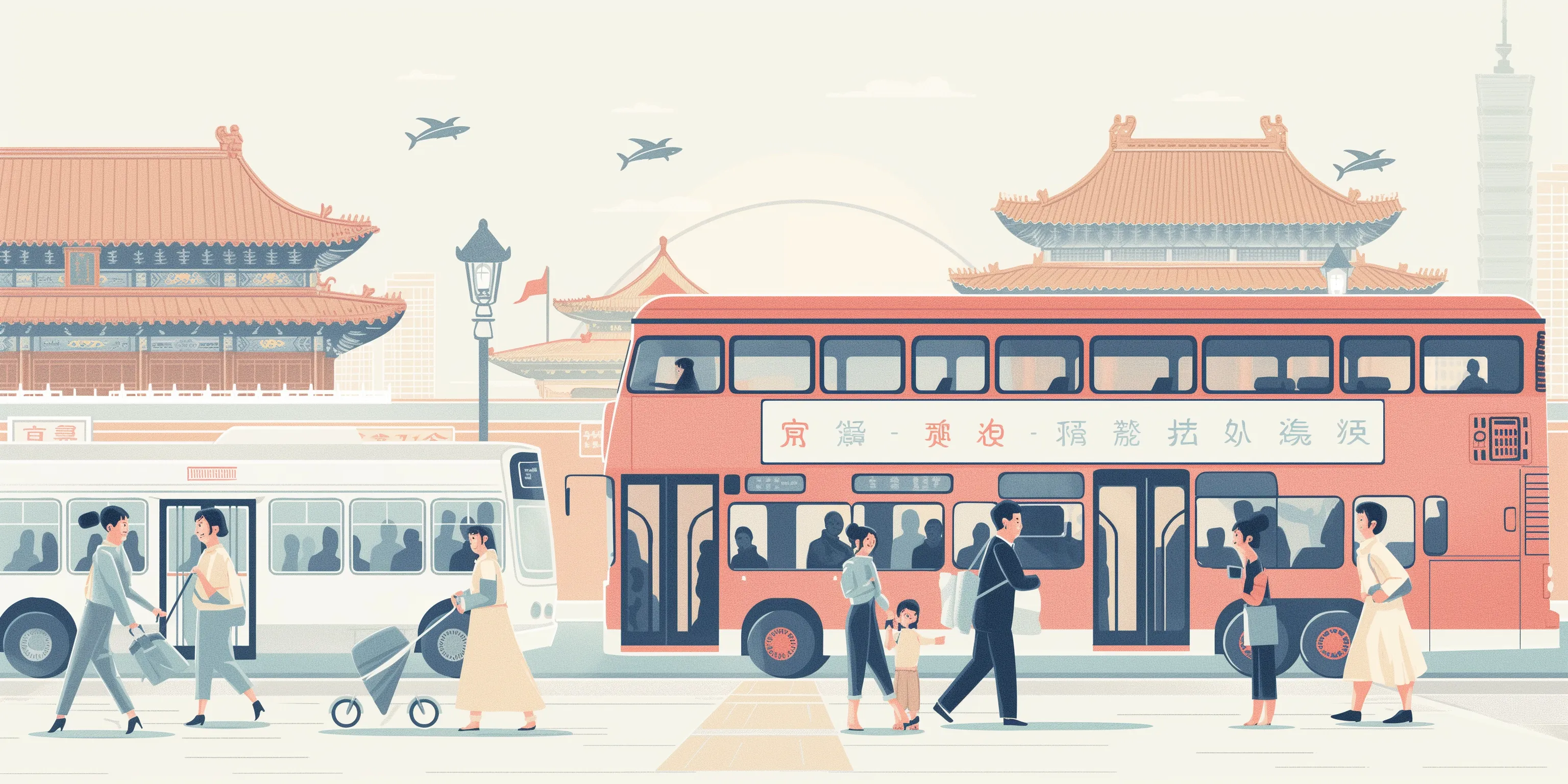Transportation in Chinese
Knowing how to talk about transportation is essential when traveling in China! In this lesson, you'll learn the Chinese words for common vehicles and simple travel phrases to help you get around with confidence.
Common Transportation Words
Let's learn these important transportation terms that you'll use when traveling:
Basic Transportation Verbs
These action words will help you talk about how you travel:
Essential Travel Phrases
These useful phrases will help you buy tickets and ask for help:
Understanding Transportation Words
Let's learn more about each of these important transportation terms:
Bus
公交车bus means "bus" - the most common form of public transportation in Chinese cities. Buses are affordable and reach places where subways might not go.
Subway/Metro
地铁subway, metro means "subway" or "metro" - fast and convenient for getting around major Chinese cities. Many cities have extensive subway networks with signs in both Chinese and English.
Taxi
出租车taxi means "taxi" - a convenient but more expensive option for getting around. In major cities, taxis are plentiful and relatively affordable compared to Western countries.
Train
火车train means "train" - an excellent way to travel between cities in China. China has an extensive railway network, including many high-speed trains.
Airplane
飞机airplane means "airplane" - necessary for long-distance travel in China. With China's vast size, flying is often the most practical way to travel between distant cities.
Bicycle
自行车bicycle, bike means "bicycle" - still a popular transportation option in many Chinese cities. Many cities now also have bike-sharing services that are convenient for short trips.
Understanding Transportation Verbs
Now let's learn how to use the key transportation verbs:
To Ride/Take
坐sit, take (transportation) means "to ride" or "to take" - used for vehicles with seats like buses, trains, and airplanes. For example: 坐公交车 means "to take the bus."
To Go
去go means "to go" - one of the most useful verbs in Chinese! You'll use this whenever talking about traveling to a destination.
To Come
来come means "to come" - another essential verb for talking about travel, especially when discussing someone coming to your location.
Travel Phrases You'll Need
These phrases will help you navigate transportation systems:
Ticket
票ticket, note, bill means "ticket" - what you'll need to purchase before taking most forms of public transportation in China.
How Much?
多少钱how much means "how much money?" or "how much does it cost?" - essential for asking about ticket prices or taxi fares.
How to Get There?
怎么去how to get there means "how to go" or "how to get there" - the perfect phrase when asking for directions to a destination.
Station/Stop
站to stand, station means "station" or "stop" - used for bus stops, subway stations, and train stations. You'll often see it combined with other words, like 公交车站 (bus stop) or 地铁站 (subway station).
Mini Transportation Dialogues
Try practicing these simple conversations about transportation:
Dialogue 1: Taking a Taxi
Dialogue 2: Taking the Subway
Dialogue 3: Buying a Ticket
More Useful Transportation Terms
Here are a few more helpful transportation words you might need:
- 高铁 - "high-speed train" - China's modern, fast train network
- 公交车站 - "bus stop" - where you wait for the bus
- 地铁站 - "subway station" - where you catch the subway
- 机场airport - "airport" - for air travel
- 单程票 - "one-way ticket" - for traveling in one direction
- 往返票 - "round-trip ticket" - for traveling there and back
Common Transportation Patterns
In Chinese, here's how to say you're taking different forms of transportation:
- 坐公交车去... - Take the bus to...
- 坐地铁去... - Take the subway to...
- 坐出租车去... - Take a taxi to...
- 坐火车去... - Take a train to...
- 坐飞机去... - Take an airplane to...
Cultural Notes about Transportation in China
Understanding these cultural aspects will help you navigate transportation in China:
- Public transportation is extremely developed in Chinese cities and very affordable
- High-speed trains connect most major cities and are often faster than flying when you consider airport travel time
- DiDi is China's equivalent of Uber and very popular in cities
- Rush hour in Chinese cities can be extremely crowded - try to avoid public transportation during these times
- Transportation apps like Baidu Maps and China's transportation apps can be very helpful with navigation
Practice Tips
- Learn the subway map of the Chinese city you plan to visit
- Practice asking 怎么去...? for places you want to visit
- Try using 坐sit, take (transportation) with different transportation methods
- Memorize the phrase 多少钱? for asking about costs
With these transportation words and phrases, you'll be able to navigate your way around Chinese cities with confidence! Whether you're taking the subway, catching a bus, or hailing a taxi, these terms will help you reach your destination smoothly. `
